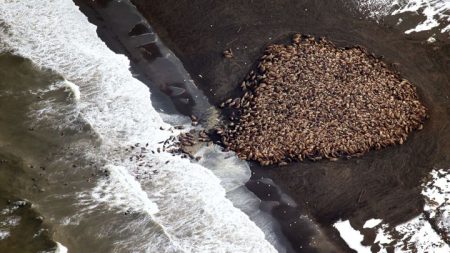The Point of No Return: Climate Change Nightmares Are Already Here

Source: Rolling Stone Historians may look to 2015 as the year when shit really started hitting the fan. Some snapshots: In just the past few months, record-setting heat waves in Pakistan and India each killed more than 1,000 people. In Washington state's Olympic National Park, the rainforest caught fire for the first time in living memory. London reached 98 degrees Fahrenheit during the hottest July day ever recorded in the U.K.; The Guardian briefly had to pause its live blog of the heat wave because its computer servers overheated. In California, suffering from its worst drought in a millennium, a 50-acre brush fire swelled seventyfold in a matter of hours, jumping across the I-15 freeway during rush-hour traffic. Then, a few days later, the region was pounded by intense, virtually unheard-of summer rains. Puerto Rico is under its strictest water rationing in history as a monster El Niño forms in the tropical Pacific Ocean, shifting weather patterns worldwide.
The “Tucson Weekly” Covers Climate Reality

We live in a world of smoke, mirrors, paid deception, and total denial. In the article below it would be more accurate to say that the Tucson Weekly covered part of the climate reality (though they left out the largest single factor to the equation, climate engineering). As conditions get rapidly worse on countless fronts, the denial grows greater from so many directions. Such behavior is a human defense mechanism that paradoxically will lead us to certain extinction if this behavior is not overcome. Scientists like Guy McPherson only tell half truths, half the equation. When I met personally with Guy, his denial of the geoengineering elephant in the room was nothing short of fanatical and aggressive. With this in mind, no matter how dire predictions are under the current course of our species, the most major consideration of all is being completely omitted from the equation, what would occur if there was a complete cessation of the climate engineering juggernaut of destruction? To simply expose the geoengineering assault against the planet and all life would shatter the foundations of the global power structure. Populations around the world would take to the streets in a shock wave of justifiable outrage. Our military brothers and sisters would then be forced to awaken to the fact that they are being used as a mechanism of their own demise. We could then have a real chance to halt climate engineering and let the planet respond on its own to the damage done. We could then inhale air that is not laden with a toxic soup of heavy metals and chemicals which are raining down from the ongoing geoengineering atmospheric spraying. We would have a chance. The article below from the Tucson Weekly is an important read and contains dire data that is for the most part on target (the climate engineering factor is of course omitted by all parties quoted in the article including Rockefeller funded environmental group 350.org). If we just go on about our lives without making the fight to expose geoangineering a priority, we will have no chance. If we face reality head-on, and make our voices heard, we may yet accomplish astounding good, even at this late hour. Dane Wigington geoengineeringwatch.org Should We Fear Near-Term Human Extinction? Source: Tucson Weekly, article by Ted Taylor Most of us have figured out by now that we are toast: Humanity will be wiped out by an asteroid, supernova, massive volcanic eruptions, global axis shift, some untreatable virus, nuclear war or climate change. Our sun is going supernova. We've seen the disaster movies, read the books and laughed at the cartoons. But how quickly? University of Arizona emeritus natural resources professor Guy McPherson, author of Extinction Dialogs: How to Live with Death in Mind, which he co-authored with Carolyn Baker, recently spoke at a Unitarian Universalist Church in Eugene, Oregon, offering dire, even shocking predictions. In his talk, McPherson figures the sixth extinction in Earth's geologic history is already under way. We could see massive die-offs of humans and other species in as little as 18 months, and humanity has at best 10 to 20 years. "I could be wrong," he admits. McPherson accuses climate scientists of "malpractice" for not being candid with the public about "our 99 percent certainty of death." "There is no expiration date stamped on us, but we have triggered events that will lead to our extinction in the not-too-distant future," he says. "Near-term human extinction" even has an acronym, NTHE, and McPherson is certainly not the first scientist or science writer to say we've damaged our ecosystem too much to fix it. The perfect storm of overpopulation, industrialization, pollution, deforestation, monocrops and pesticides, invasive species, urban sprawl, overfishing, warfare, reliance on fossil fuels, ignorance and corruption (and accompanying bad public policy) have had scientists waving distress flags for decades, even before Rachel Carson's Silent Spring of 1960. The warnings have been ignored or ridiculed at the international, national, state and even local level, thanks in part to a well-funded, right-wing campaign representing the short-term interests of heavy industry, mining and fossil fuel corporations. A growing number of Americans, a record 40 percent, think the dangers of climate change are exaggerated, according to Gallup polling in recent years. President Obama has helped Democrats wake up to the seriousness of climate change, but 68 percent of Republicans believe the threat is non-existent or overblown. Science is playing second fiddle to politics. McPherson is correct that few climate scientists are talking about imminent human extinction, but is it a matter of professional "malpractice" or is the scientific community simply less inclined to radical extrapolation for fear of losing credibility (and grants)? Although McPherson is a scientist, he's not a climate scientist doing field research. Phil Mote, director of the Oregon Climate Change Research Institute at Oregon State University, is skeptical of McPherson's predictions: "I've been connected to national and international assessments of the state of the science of climate change, and although my colleagues and I are generally very concerned about what challenges climate change is bringing to humankind, no expert that I have read has used language like 'extinction of the human race.' I refer of course to the Intergovernmental Panel on Climate Change, U.S. National Climate Assessment and various U.S. National Academy of Sciences reports." Mote is involved with the IPCC, which won the Nobel Prize in 2007 along with Al Gore for their "efforts to build up and disseminate greater knowledge about man-made climate change, and to lay the foundations for the measures that are needed to counteract such change." Elizabeth Kolbert, author of the Pulitzer Prize-winning The Sixth Extinction, says, "What is clear, and what is beyond dispute, is that we are living in a time of very, very elevated extinction rates, on the order that you would see in a mass extinction, though a mass extinction might take many thousands of years to play out." What do local climate change activists think about McPherson and his predictions? "I can appreciate the sledgehammer—especially when people with
